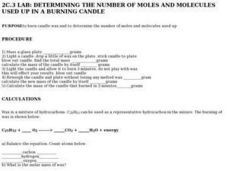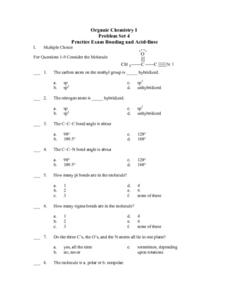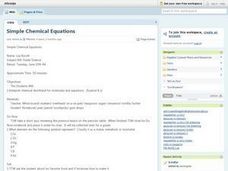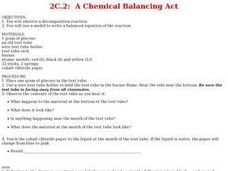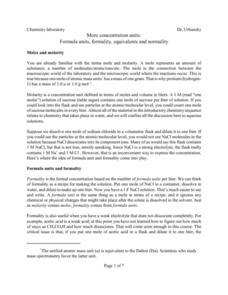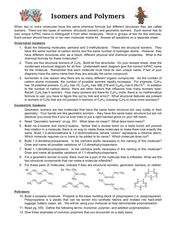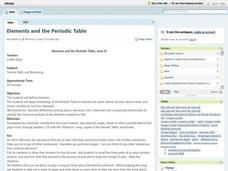Curated OER
Lab: Determining the Number of Moles and Molecules Used Up In a Burning Candle
Students find moles and molecules used when a candle burns. In this moles and molecules lesson plan, students calculate the initial mass of a candle and the mass of a candle after it burns for 3 minutes. They calculate the mass lost when...
Curated OER
WS 4.2 The Mole
In this moles worksheet, students convert measurements of moles to mass, measurements of mass to moles, measurements of moles to atoms or molecules and measurements of atoms or molecules to moles.
Curated OER
Making Molecules
In this making molecules worksheet, students complete a table of elements with their symbol, atomic number, atomic mass, number of protons, number of electrons, period and group. Students then make models using pipe cleaners and beads of...
Curated OER
Physical Science Project-Atom
Fifth graders investigate atoms. In this atom lesson, 5th graders investigate the parts of an atom. Students explore atom numbers and determine the number of electrons is in each atom.
Curated OER
Practice Exam Bonding and Acid-Base
In this chemistry worksheet, students respond to several multiple choice questions relating to bonding and acid-bases. They also identify the various types of bases and how they differ from each other.
Cornell University
Atomic Bonding
Explore the connection of surface area to bonding within atoms. Learners complete lab investigations to model changing surface area with different sizes and concentrations of atoms. A flour fireball demonstration follows the labs to...
Curated OER
Stereochemistry Problem Set 9
In this chemistry worksheet, students write how many chiral C's are in each of the compounds listed. Then they draw the Fischer projections for all stereo isomers in 5 and in 6. Students also match the correct Fischer projection to each...
Curated OER
Reading Chemical Formulas
Students interpret basic chemical formulas. When class begins, students interpret a "chemical formula" for fruit salad. After they interpret the recipe, students use the same strategies to identify chemical formulas. They evaluate the...
Curated OER
Bhopal - Covalent Bonding
Using the chemicals that leaked in the Bhopal gas tragedy of 1984, chemists examine covalent bonds. Provide for them the chemical reactions and have them draw Lewis diagrams for the molecules involved. That's about all there is to the...
Curated OER
Simple Chemical Equations
Eighth graders interpret the chemical symbols and shorthand used for molecules and equations. Through guided practice, 8th graders work to decipher and interpret the symbols for chemical equations. An opportunity for independent...
Curated OER
Basic Chemistry Review
Students experiment to show their knowledge of molecules and atomic structures. In this chemistry review lesson students participate in an activity and then fill out a worksheet.
Curated OER
Causal Patterns in Density Phenomena
Learners consider the causes of density at a microscopic level. They then discover that one cause of density has to do with how many protons and neutrons the material contains.
Curated OER
Gases and Plasmas
Young scholars determine what plasma is and why the sun is made up of plasma. They recognize situations where plasmas are found in nature and made by man. They discuss why the sun is a huge ball of plasma and if there are different...
Curated OER
A Chemical Balancing Act
Learners decompose glucose and write an equation for the reaction. In this decomposition reaction lesson plan, students burn a sample of glucose and test the products for water using cobalt chloride paper. They write a balanced equation...
Curated OER
pH Scale, acids and bases
Eighth graders define the pH scale, acids and bases. They distinguish between acidic and basic solutions using litmus paper. Students review simple chemical formulas. They define the subscript and coefficient in terms of chemical...
Curated OER
Formula Units
In this chemistry worksheet, students examine the concepts of mole and molarity in order to apply in the laboratory setting. The sheet includes in depth background information.
Curated OER
Introduction to the Mole
Students are introduced to the mole concept using a discovery-based method. Lesson includes activities with candy that allow students to discover the rules for mole-item, item-mole, mole-mass, and mass-mole conversions.
Curated OER
Isomers and Polymers
Students create models of structural isomers, geometric isomers, and polymers. In this chemistry lesson, students are given definitions and molecular model kits to create a variety of different isomers and polymers.
Curated OER
Stiochiometry: Quantifying Changes in the Environment
Students examine stoichiometry. In this chemical reaction and mole lesson, students complete an experiment based on readiness levels to explore that changes are quantified in chemical reactions.
Curated OER
The Water Cycle/States of Matter
Students engage in a lesson that is concerned with the water cycle and different states of matter. They conduct research using a variety of resources in preparation for taking a quiz. Then students take the quiz in correlation to having...
Curated OER
How Are The Properties of Covalent Compounds Influenced By Chemical Bonding?
Students work together to observe the bond lengths of single, double and triple bonds. They make their own predictions about the strength of the bonds and chemical reactions. They answer discussion questions to complete the...
Curated OER
Elements and the Periodic Table
Students are introduced to the elements on the Periodic Table and what is meant by element. Using the Table, they identify the name, atomic mass, number and symbol of each element. To end the instructional activity, they discover the...
Curated OER
The Air Up There!
Students create a model of a column of air and discover one of the reasons why low and high pressure systems exist and why low pressure is often associated with bad weather.
Curated OER
Drops on a Penny
Eighth graders experiment to determine the number of drops of water a heads up penny hold. They create a stem and leaf graph of the class results and use the data for further experimentation on a tails up penny.
